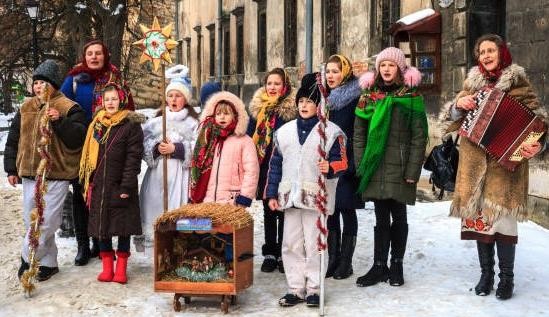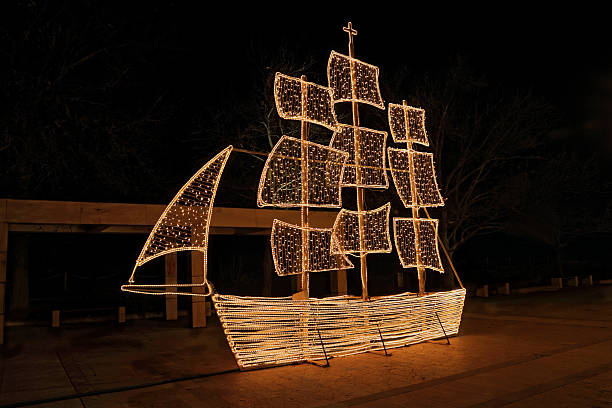Discovering Orthodox Christmas Traditions
by Nastassia on Dec 14, 2023Reading time: 4 min.

As the holiday season unfolds, the spirit of Christmas fills the air with warmth and joy. Many Au Pairs and Host Families will celebrate Christmas on December 25th, but did you know that a big part of the world will wait for another 2 weeks to celebrate the Orthodox Christmas?
Orthodox Christmas and Western Christmas differ not only in their date: Western Christmas follows the Gregorian calendar and is celebrated on December 25th, while Orthodox Christmas follows the Julian calendar, falling on January 7th; another distinction lies in the cultural and religious traditions associated with each celebration, as Orthodox Christmas often features unique customs, such as the Alilo procession in Georgia or the Badnjak ceremony in Serbia.
Let’s uncover some traditions that make Orthodox Christmas a cherished time for families and communities. From midnight services to joyful caroling, each country has its own way of commemorating this holiday. In this article we will take a look into the heartwarming and diverse ways people in Ethiopia, Ukraine, Greece, Georgia, and other countries spend this day, celebrating not only a religious event but a shared cultural heritage that brings people together. Whether you are an Au Pair that celebrates the Orthodox Christmas or an Orthodox Host Family, we hope you will share your traditions and spend this joyful day together. Meanwhile, let’s travel the Orthodox world and see how Christmas is celebrated in different places.
 In Greece, particularly in coastal areas, it is common to have a Christmas boat procession. This tradition involves decorating boats with lights and ornaments and showing them in harbors and coastal areas. It symbolizes the maritime heritage of the country and is often accompanied by music, dancing, and fireworks.
In Greece, particularly in coastal areas, it is common to have a Christmas boat procession. This tradition involves decorating boats with lights and ornaments and showing them in harbors and coastal areas. It symbolizes the maritime heritage of the country and is often accompanied by music, dancing, and fireworks.
In Syria, the Christian community celebrates Christmas with a unique tradition called "Ma'rahat Al Eid" or the "Holiday Swing". Families build a swing in their homes, and family members take turns swinging while singing traditional Christmas hymns. It is a fun and joyful way to celebrate the festive season.
In Georgia, the Alilo procession is an important Christmas tradition. On January 7th, people dressed as characters from the Nativity story: angels, shepherds, and the Holy Family, march through the streets singing carols and carrying religious symbols. The procession ends in church services, where participants often give out sweets and blessings to the community.
In such countries as Belarus and Bulgaria, the Christmas season is called Koleda or Kaliada. In Bulgaria, Kukeri, costumed men in elaborate attire, participate in processions, performing rituals believed to scare off evil spirits and ensure good fortune for the coming year. In Belarus villagers also form processions, singing Kaliada songs to bring blessings and prosperity to households. Rooted in ancient Slavic folklore, Kaliada incorporates singing with masked characters representing animals and mythical beings. The festivities include bonfires as a symbol of the triumph of light over darkness, and emphasize hospitality, with hosts offering food and drink to Kaliada performers
Orthodox Christmas and Western Christmas differ not only in their date: Western Christmas follows the Gregorian calendar and is celebrated on December 25th, while Orthodox Christmas follows the Julian calendar, falling on January 7th; another distinction lies in the cultural and religious traditions associated with each celebration, as Orthodox Christmas often features unique customs, such as the Alilo procession in Georgia or the Badnjak ceremony in Serbia.
Let’s uncover some traditions that make Orthodox Christmas a cherished time for families and communities. From midnight services to joyful caroling, each country has its own way of commemorating this holiday. In this article we will take a look into the heartwarming and diverse ways people in Ethiopia, Ukraine, Greece, Georgia, and other countries spend this day, celebrating not only a religious event but a shared cultural heritage that brings people together. Whether you are an Au Pair that celebrates the Orthodox Christmas or an Orthodox Host Family, we hope you will share your traditions and spend this joyful day together. Meanwhile, let’s travel the Orthodox world and see how Christmas is celebrated in different places.
Christmas on a Boat
 In Greece, particularly in coastal areas, it is common to have a Christmas boat procession. This tradition involves decorating boats with lights and ornaments and showing them in harbors and coastal areas. It symbolizes the maritime heritage of the country and is often accompanied by music, dancing, and fireworks.
In Greece, particularly in coastal areas, it is common to have a Christmas boat procession. This tradition involves decorating boats with lights and ornaments and showing them in harbors and coastal areas. It symbolizes the maritime heritage of the country and is often accompanied by music, dancing, and fireworks.
Fun Activities
Ethiopia also follows the ancient Julian calendar, and Christmas, known as Ganna, is celebrated on January 7th. The celebration involves attending church services, processions, and special meals. Traditional games, such as a form of hockey called 'genna', are also played during this time.In Syria, the Christian community celebrates Christmas with a unique tradition called "Ma'rahat Al Eid" or the "Holiday Swing". Families build a swing in their homes, and family members take turns swinging while singing traditional Christmas hymns. It is a fun and joyful way to celebrate the festive season.
Christmas Characters
In Russia, Grandfather Frost (Ded Moroz) and his granddaughter, the Snow Maiden (Snegurochka), are traditional characters associated with the New Year’s and Christmas seasons. Grandfather Frost brings gifts to children on New Year's Eve, and other activities often include decorating fir trees, festive meals, and the singing of carols. Another interesting fact about Russia’s winter holiday season is that New Year’s Eve is celebrated much wider than Christmas, which is often spent in a small family circle after the main New Year’s festivities are over.Festive processions and ceremonies
In Serbia, a traditional Christmas Eve ritual involves the Badnjak ceremony. Families gather branches or logs from an oak tree, symbolizing the tree under which it is believed that the shepherds received the news of Jesus' birth. The Badnjak is then burned in the family home, accompanied by prayers for health and prosperity.In Georgia, the Alilo procession is an important Christmas tradition. On January 7th, people dressed as characters from the Nativity story: angels, shepherds, and the Holy Family, march through the streets singing carols and carrying religious symbols. The procession ends in church services, where participants often give out sweets and blessings to the community.
 Koleda
Koleda
In such countries as Belarus and Bulgaria, the Christmas season is called Koleda or Kaliada. In Bulgaria, Kukeri, costumed men in elaborate attire, participate in processions, performing rituals believed to scare off evil spirits and ensure good fortune for the coming year. In Belarus villagers also form processions, singing Kaliada songs to bring blessings and prosperity to households. Rooted in ancient Slavic folklore, Kaliada incorporates singing with masked characters representing animals and mythical beings. The festivities include bonfires as a symbol of the triumph of light over darkness, and emphasize hospitality, with hosts offering food and drink to Kaliada performers
Carol singing
Ukraine is famous for its Christmas singing known as Shchedrivky (New Year's carols). There is a rich variety of Shchedrivky: the melodies and lyrics are different from region to region, reflecting the cultural diversity within the country. Some Shchedrivky are ancient and have been passed down through generations, while others may be more contemporary. The most famous Shchedrivka, known as "Shchedryk", gained international popularity when Ukrainian composer Mykola Leontovych adapted it into the well-known Christmas song "Carol of the Bells".
Five tips to learn a language faster
by Agata Telefus on 29 Nov, 2023
Read More »
Sexual harassment during Au Pair stay
by Genesis Rivas on 18 Dec, 2023
Read More »
Categories:
Popular posts:
Join us
Are you looking forward to starting the Au Pair program? AuPair.com will help you find your future Au Pair / Host Family.
Register as an Au Pair
Register as a Family
Register with us and get to know what we can do for you:
